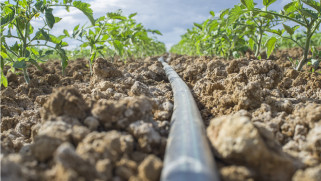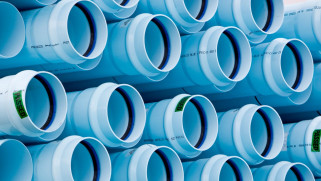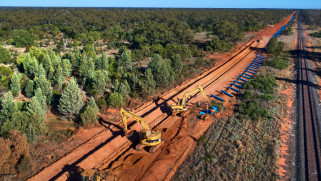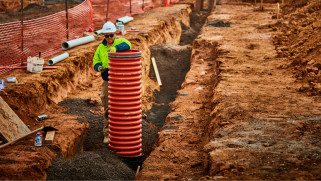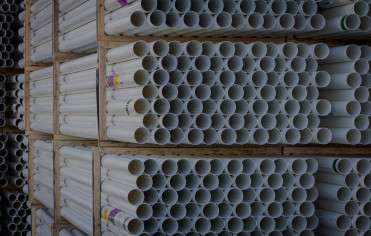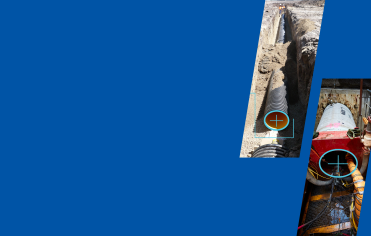Originally published by Inside Water, April 2023
The Iplex EZIpit provides the latest advancements and allows innovative solutions for design and installation challenges. It provides excellent in-ground performance for gravity sewer maintenance and inspection structures.
The EZIpit consists of high-quality polypropylene bases, flexible polypropylene risers and GATIC covers. The EZIpit offers significant benefits and flexibility in designing and constructing gravity sewer networks. Water authorities’ environmental, technical, and economic demands for water-tight and durable sewer systems are essential to the community’s sewer networks.
Being primarily a plastic structure, the EZIpit is lightweight yet durable. It provides high chemical resistance in harsh environments and throughout coastal locations. These attributes make the EZIpit fast to install and reduce the need for ongoing maintenance throughout its service life.
The EZIpit is designed for buried gravity sewer applications and supplements Iplex’s plastic pipeline range. The EZIpit is used for inspecting and maintaining sewer network systems. It consists of a base, a single-wall corrugated riser, a reducing cone for maintenance holes and a range of covers designed for trafficable and non-trafficable areas. The design allows safe access to the sewer from the surface.
What are the benefits?
“The speed and safety to install compared to some conventional products are two of its main benefits,” said Nathan Swaffer, Iplex’s Product Marketing Manager. “It is also very durable. Yes, it’s plastic, but it doesn’t mean it’s weak. Plastic is very durable in harsh sewer environments where pits can be exposed. Gases that develop and permeate through sewers have been known to corrode traditional materials used in such applications.”
When the EZIpit was being developed, product designers also considered typical ground conditions. They include coastal environments, which are often prevalent in Australia.
“The surrounding soils can be acidic, which can attack some conventional materials,” said Swaffer. “They are known as acid sulphate soils. Then we bump up against the coastline, so we can have a lot of salt in our environment, which can also harm many conventional materials. However, being manufactured from polypropylene, the EZIpit is more durable in these applications.
Where is it being used?
The first example of the EZIpit used in Australia was in 2005 in southwest Sydney near Warragamba Dam. As part of a priority sewerage program, a project known as the Mulgoa, Wallacia, Silverdale Backlog Sewer Project was undertaken as a reduced infiltration trial project.
The EZIpits were selected as an alternative to standard concrete utility holes to understand how the system would perform over time. They were paired with solvent-welded pipe instead of rubber ring jointed pipe. Approximately 100 maintenance chambers and utility holes were installed.
Since then, the features of the EZIpit and its three different sizes (DN425, DN600 and DN1000) have been recognised and utilised by contractors around Australia. Michael Lancuba, Product Manager for Engineered Products at Iplex, added that the EZIpit has made life easier for communities throughout its deployment.
“The EZIpit is a lightweight modular system that makes it easy to transport into people’s backyards without heavy lifting equipment. That meant minimal disruption, a smaller footprint, and less risk of damaging people’s properties, like their fencing and driveways,” said Lancuba.
The customer perception
The Iplex team of sales engineers hold close relationships with their clients. They assist where required by providing support to customers and contractors who may have questions about the EZIpit.
“The main benefit for the contractor is the speed of installation,” said Miklich. “The integrated flex-swivel socket in the base meant that slight changes in alignment were possible to account for different pipe installation options.”
The growing use of plastic pits is changing attitudes across Australia. Plastic can last much longer and is more durable than many conventional materials. It’s a point that Lancuba focuses on when talking to local councils and water authorities.
“Plastics such as polypropylene have excellent chemical resistance. Hydrogen sulphide gases and the resultant sulphuric acid can be common in gravity sewers, so plastic structures are resistant to sulphuric erosion. We sometimes find situations where the soil can also be acidic, and can attack the sewer, so plastics are more appropriate in these environments. The structures will provide years of corrosion-free service from a water authority and council perspective. That reduces the maintenance costs, which is a big benefit in their eyes,” said Lancuba.
Miklich added that the EZIpit had been designed for Australian conditions. For example, the seals in the joints are designed to be water-tight to Australian Standards and resist tree roots from penetrating the joints. This ensures the long-term durability of the EZIpit for decades to come.
“The components offer our customers flexibility in design and during installation. We can change the bases, the orientation of the pipes… the options are endless in terms of how we design the EZIpit for our customers.”
For more information, visit www.iplex.com.au/the-iplex-ezipit-range
